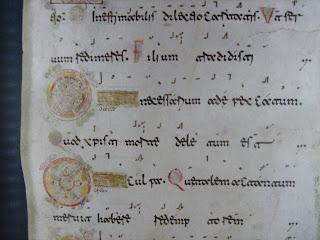
Genesis 1:1-31; 2:1-2 / Exodus 14:24-31; 15:1 / Isaiah 4:2-6 / Isaiah 54:18; 55:1-11 / Colossians 3:1-4 / Matthew 28:1-7
We want to be able to go back again. We have seen the devastation wrought by our misdeeds, by our ill-placed words, by our callous indifference, by our numberless offenses and omissions. We long for a salvation that lets us start from the very beginning, to wash all things new. It is a great hope to begin again when things are fresh, when the burdens and cares, the aches and pains, of a lived lived poorly can be traded in for a repetition, a restoration of its pristine innocence. After all, who hearing God's litany at the beginning of all things, when the almighty said again and again Fiat, and saw that it was good, would not trade anything to walk again with that first man and first woman, God's very image and likeness, unsullied by years of misspent energy? Who would not gladly hand back the life he has led if he could begin again in that primal greening of the earth, breathe in the life-giving coolness of that first breeze, hear for the first time the happy chrips, bleatings, roars and howls of beasts who gleefully attend to us as their lords and masters, sharing with us the unbloodied food of plant and fruit?
But, God's way is not the way of erasing the past, the waters of Baptism are not the Fountain of Youth. We have in Christ's victory not a return to our first birth so as to live our life over again, but the promise, and indeed the fulfillment of a new birth, for we have died and our life is hidden with Christ in God.
This has ever been God's way with the world. When the primal goodness of Eden was poisoned by sin, God sent us not a new world, but a new covenant with Noah and his descendants. When the peaceful wanderings of the patriarchs in Canaan was traded for slavery in Egypt, God did not simply return his people, but placed them under the sweet yoke of the Law. When the judges proved distasteful to Israel, God raised up not new judges, but kings, for weal and for woe. In calling his people back from Babylon, God did not restore the glories of David and Solomon, but promised new hearts and new spirits. When the Word came to his own and his own received him not, he gave his chosen people, and all peoples of the world besides, a share in the very life of God.
This we must know, that each of us is placed upon this earth, indeed every created thing is called forth by the Almighty, to enrich the whole of creation with some good that it, and it alone, can give. When that good is lost, it is lost forever. Are there new goods yet to come? Undoubtedly. Are those new goods far surpassing even those that are lost? So we live in certain hope. Are there some who never have, and never will, taste joy after they have cast aside their good? Tragically, this also is true.
Even so, who would wish away Cain, if it meant never receiving the pleading of the blood of Abel? Who would desire there never was an idol, if it meant never rejoicing in the faith of Abraham? Would we have the sons of Israel stay their hand with their brother Joseph if that meant no victory over the God's of Egypt or deliverance by Moses at the Red Sea? If it meant never hearing the comforting prophecies of Isaiah, could we honestly wish away the infidelities of Israel and Judah? Indeed, would we trade that whole sad catalog of misery and wretchedness, of infidelity, cruelty, spite, and malice, of fear, jealousy, and despair which has sprung from Adam's seed if it meant never hearing the voice of the angel? Do not be afraid; for I know that you seek Jesus, who was crucified. He is not here, for He has risen even as He said. Come, see the place where the Lord was laid. And go quickly, tell his disciples that He has risen, and behold, He goes before you into Galilee; there you shall see Him.
As it is, there is no wishing away our past, no calling back the goods we have lost from the void where they are irrevocably lost. Still, when we consider the imponderable mystery of this night, dare we believe that even this loss will be for us who have been redeemed by the blood of the Lamb, a source of indescribable and everlasting glory?
O certe necessarium Adae peccatum, quod Christi morte deletum est! O felix culpa, quae talem ac tantum meruit habere redemptorem! O truly necessary sin of Adam, which the death of Christ has blotted out! O happy fault, that merited such and so great a Redeemer!
No comments:
Post a Comment